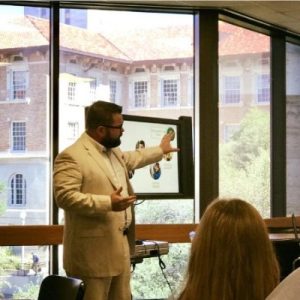By: Catherine Morgan, MSTC Class of 2020
Let me start off by saying I’m an off-the-charts extrovert who has very few qualms with “putting herself out there” in most capacities. I enjoy things like improv acting, leading presentations, and even networking – activities that often provoke wild anxiety for some. I’m a newly-twenty-six-year-old who’s incredibly lucky to say that she’s had a substantially accelerated career path to her current dream job at a fantastic company involving learning, doing, and being responsible for things arguably much earlier than most. Despite the extroversion, confidence, and professional experience I’ve worked so hard to hone, I found myself in literal tears on the way to my first day of grad school (seriously, I can’t believe I made it safely down I-35 in retrospect).
Imposter Syndrome is so real. A Harvard Business Review article defines it as “a collection of feelings of inadequacy that persist despite evident success.” I remember opening my acceptance letter to the MSTC Program with such elation; however, soon after all of the “I got in!” texts were sent and phone calls were made, the nerves started to settle in. In the MSTC Class of 2020, 38% held previous graduate degrees, 52% were already entrepreneurs, and almost 73% were male – I fit into none of those percentages. Not to mention, I was exactly a decade younger than the class average and I looked even younger according to the number of times I get asked for my ID in exchange for cocktails.
Compared to everyone else, I felt and looked like this neophyte-child who would be so lost in MSTC’s rigorous academic setting. Flashbacks of seeing the big, fat “44%” grade at the top of my undergrad “Intro to Accounting” final exam from six years prior was constantly nagging at me. The MSTC curriculum – which includes an Accounting course – is based on collaborative work within small, assigned teams and I sincerely struggled to see what value I could possibly bring the handful of students that would ultimately get strapped with me as their teammate. For the first time in a long time, I experienced the debilitating weight of Imposter Syndrome that led me to believe my acceptance was an absolute mistake and the thought of showing up to class was an even bigger one.
Despite the irrational fears and tears, Day One arrived and I did show up (I mean, I had already forked over the deposit). I quietly walked up to the check-in table where I half-expected my name to have an asterisk next to it for someone to pull me aside and say my enrollment was a farce. To my surprise, my name was there – sans asterisk – and I was even given a swag bag and snacks like the rest. I moseyed over to sit with my team of all dudes, trying so hard to give off an “I totally didn’t just cry on the way over here” vibe. Dr. Murphy opened our session by having us write down what was going through our heads, realize everyone’s contributions were related to the same social anxieties, and commit ourselves to putting those thoughts on a back-burner for the week; I could feel Imposter Syndrome’s tight grip on me begin to release. I met my team; we talked about all of our individual strengths, weaknesses, areas in which we sought to improve, and overall expectations and goals for the program. I was so thankful to realize that my strengths were all areas that the dudes surfaced as their weaknesses; starting to believe I might actually generate value for this group, I felt even less of an “Imposter.”
Fast forward almost ten months: my team, Task Force Awesome, is still completely in-tact (we even gained a strong teammate after the first semester) and thriving as both a unit and individual students. Task Force Awesome is a consistently high-performing team that has relentlessly worked to build and improve skills with our pitches, proposals, and forecasting; and, for those keeping score, I actually more-than-doubled my performance in MSTC Accounting compared to that of my undergrad (see, there’s hope!), and took ownership of many substantial team deliverables. Beyond Task Force Awesome (and most importantly), I feel that our entire Class of 2020 personally knows the value that each student individually brings to the MSTC Program. We’ve spent every-other weekend together for almost a year; we attend community events and internationally traveled together; most pivotally, we’ve been our most vulnerable selves with each other since Day One with Dr. Murphy. The time we’ve dedicated, discussions in which we’ve engaged, and implicit commitment to transparency and vulnerability have all contributed to creating an approachable environment where everyone recognizes their individual value, other students’ value, and opportunities to capitalize and expand on both.
The MSTC Class of 2020 is so many things; Gen-X and millennial representative, extroverted, introverted, technical and non-, we have fashion designers, salespeople, product managers, military leaders, attorneys – we even have at least one Aggie amongst our crew. What I can tell you we don’t have: Imposters. Everyone has and knows their respective purpose for being here, including my improv-acting, demographically-self-conscious, and terrible-at-undergrad-Accounting self. So, if you find yourself on the way to an anxiety-provoking activity like a presentation, networking event, or even your first day of MSTC, and are experiencing symptoms of Imposter Syndrome – you’re likely right at home with the rest of us “Imposters” who learned to be vulnerable and valuable, together.






